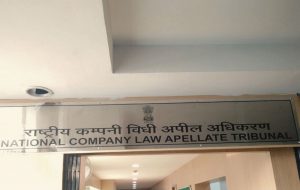National Company Law Appellate Tribunal (NCLAT): The Division Bench of Venugopal M (Judicial Member) and Alok Srivastava (Technical Member) held that a demand notice is a forerunner to the commencement of insolvency proceedings against a corporate debtor. Unpaid demand notice is good enough to exhibit the debtor’s inability to pay its debts for bankruptcy proceedings. If a bonafide dispute is established then an ‘Insolvency’ petition is not the appropriate proceeding to determine the validity of a disputed debt.
On being aggrieved with the decision of National Company Law Tribunal, Mumbai, the present Company Appeal was preferred by the appellant.
Appellant submitted that no ‘Demand Notice’ was ever served on the Corporate Debtor/Second Respondent as per Section 8 of the Insolvency and Bankruptcy Code.
Tribunal’s Assessment
Tribunal noted that the appellant’s plea stated that the alleged Demand Notice of the respondent 1 was sent to an address and the same was not registered address of the ‘Corporate Debtor’ as per the master data of the ‘Corporate Debtor’ on MCA website.
Further, it was submitted by the appellant that the Demand Notice was knowingly addressed to the wrong address of the ‘Corporate Debtor’ by respondent 1.
Tribunal expressed that:
As per Section 8 of the I&B Code an Operational Creditor is required to deliver a demand notice on the occurrence of the default within ten days from the receipt of the demand notice, the Corporate Debtor shall bring to the notice of the Operational Creditor ‘the existence of the dispute’, if any, and the record of the pendency of the suit or arbitration proceedings before the receipt of such notice or invoice in relation to such dispute.
While proceeding with discussion in the above matter, Bench also stated that a change in address of the registered office of the ‘Corporate Debtor’ cannot be a ruse for the failure of the party concerned to send/issue a ‘Demand Notice’ as per Section 8 of the I&B Code. In fact, serving the demand notice to the corporate debtor is mandatory.
“If a demand notice payment under the code is issued, the ‘Corporate Debtor’ will appreciate in right earnest the consequences flowing on account of failure to pay the ‘operational debt’. Also, that . after transfer of the case form High Court to Tribunal (in respect of winding up petition) an Operational Creditor is required to submit all information including the details of the proposed Insolvency Professional.”
Tribunal opined that service of ‘Demand Notice’ to the second respondent is mandatory as per Section 8 of the Code.
Further the Bench while making observations in the present matter also added that it cannot be forgotten that the proceedings under Section 138 NI Act pertain to criminal liability for dishonour of cheques issued and do not bar an application under Section 9 of the Code. Likewise, the pendency of proceedings under Order 37 of the civil Procedure Code will not prohibit an application under Section 9 of the Code.
While concluding, the Tribunal held that:
Since the ‘Service of notice’ at the registered address of the ‘Corporate Debtor’ was not established to the subjective satisfaction of the Tribunal and the admitted fact being that the notice sent to the second respondent at its registered office got returned, the said admission of debt and the reference with regard to NI Act that a holder of cheque received the cheque for the discharge either in whole or in part of any debt or other liability will not in any way heighten or improve the case of appellant.
Since the notice as per Section 8 of I&B Code was not served upon the corporate debtor and the same got returned, NCLT’s decision is to be set aside.
Hence NCLT’s order is to be declared as illegal in appointing the ‘Interim Resolution Professional’ declaring moratorium and all other orders passed. Corporate Debtor is therefore released from all the rigour of law and is allowed to function independently through its Board of Directors.
Before parting, Tribunal granted liberty to the Operational Creditor to issue a fresh notice under Section 8 of I&B Code and on receipt of such notice of service if there is ‘Debt and Default’ to file a fresh application under Section 9 IBC. [Shailendra Sharma v. Ercon Composites, 2021 SCC OnLine NCLAT 3, decided on 13-01-2021]

